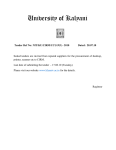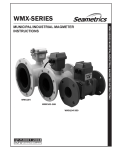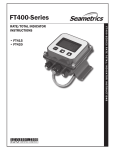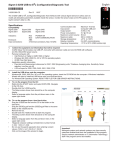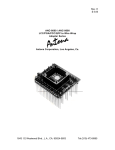Download MFM220 User Manual
Transcript
Menu MFM220 & MFM220DC Plastic-Bodied Magmeter The 2" Flow Meter Series are a full-bore, plastic-bodied electromagnetic flow meter designed for flow and usage monitoring applications in 2" pipe. The polypropylene flow tube offers corrosion resistance to a wide range of chemicals. Its light weight and clamp flanges allow it to be easily installed or removed from the pipe for inspection. There are multiple configurations. APPLICATIONS With no moving parts, the magmeter permits unobstructed flow, minimizing flow disturbances. The 2" Meter Series can be used in piping configurations where there is little space between the meter and valve. The 2" Meter Series, like other magmeters, are resistant to wear from debris. Since there are no bearings or propeller to wear out, downtime and m aintenance are kept to a minimum. Because there are no mechanical parts in the flow stream, the meter tolerates high flows without damage. Please note that flow does not automatically turn the meter on. FEATURES The hinged, polyethylene cover protects from dust and UV rays, while permitting easy access to the LCD flow rate and total display. The electronics housing is made of rugged powder-coated die-cast aluminum. Flow rate and total can be displayed in a variety of units, customerselected and factory-set. sage monitoring, such as: U • Industrial wastewater discharge monitoring • Cooling tower deduct metering • Heap leach mining discharge monitoring • Well monitoring • Turf and landscape water monitoring • Agriculture liquid monitoring • • • • • • Simple as a mechanical meter No moving parts Minimal straight pipe required Battery powered Built-in rate & total indicator Corrosion resistant * Will not read petroleum based liquids. The 2" Meter Series are used for tracking flow rates and total flow in usage monitoring applications. These would include wells, industrial wastewater, leach mining discharge, cooling tower deduct metering, turf and landscape applications, and other water reclamation operations. When changing the batteries, the 2" is designed to retain the internal settings and flow total. The flow meters are externally powered via a 5-pin connector cable (20ft/6m) which also provides pulse output for use with a variety of displays and controls for remote reading, data logging, pulse-to-analog conversion, and telemetry applications. Unobstructed Flow 150 Banjo Drive Crawfordsville, IN 47933 ph: 765-362-7367 fax: 800-458-0232 www.banjocorp.com The flow meters are a battery-operated unit for use when pulse output is not required. The batteries are user replaceable with an approximate 1-year life under continuous use, or more depending on the duty cycle. The flow meters shut off after minutes of inactivity to preserve battery life. Manual# FMM2000 INSTRUCTIONS 6. The “EP” is an error message meaning that the system is idle and there is no fluid traveling through it at that time. 1. When placing the flowmeter in line, it is important to rotate the flowmeter so that it is approximately at a 45-degree angle. (See figure 1) This will improve performance of the flow meter. The flow meter can be placed vertical as long as flow is sufficient to fill the pipe. 2. There are 3 photoeyes located on the face of the flow meter. 7. It is recommended to have at least 20 inches of straight pipe before the flow meter and at least 20 inches after. 8. The cover can be rotated. To rotate cover 90°, remove the 4 cover bolts and carefully rotate the cover to the desired position. Take note not to pull or pinch any of the connecting wires. To rotate the cover 180°, remove the 4 cover bolts, the 6 AA batteries and the 2 screws that hold the battery holder in place. Then rotate the battery holder and the cover together to the desired location. Take note not to pull or pinch any of the connecting wires. Note: These are not buttons so you will not push them, instead, to activate you must hold your finger over the photoeye for 2-4 seconds. To reset the running total you must hold your finger over both the “batch reset” and the “batch/total” photoeyes. If you would like liters rather than gallons, you will need to hold your finger over the first and third photoeyes at the same time. (See figure 2) 3. There are six (6) AA batteries located inside the flow meter. To replace the batteries, simply remove the four cover bolts and gently remove the top cover. Replace batteries and fasten cover back in place. Be careful not to pinch any wires when assembling the cover. It is a good idea to change the batteries yearly. photoeye 4. The flow rate of the meter is designed to have an unlimited flow, meaning that the meter will read as much flow as one can push though a 2" full port coupling. However, the accuracy of the meter decreases as the meter reaches flows under 6 GPM. From 6 to 300 GPM the meter is within 2-3% accuracy. 5. Its advisable to thoroughly clean the meter and the electrodes at least once a year. This can be done by gently rubbing the electrodes with a piece of emery cloth. FIGURE 1 2 FIGURE 2 FEATURES DIMENSIONS Polyethylene protective cover 4 5/32" 4 5/32 LCD rate and total indicator 6 2 12/1/32 32" 2 Powder-coated die cast-aluminum electronics housing 5½" 5 1/2 3¾" 3 3/4 Corrosion-resistant glass-filled polypropylene body Lightweight for easy handling Clamping flanges for ease of installation 3 316 SS electrodes SPECIFICATIONS* SPECIFICATIONS 2" Full Port Flange Clamps 150 PSI or 10.3 bar working pressure @ 70°F 10° to 130°F (-12° to 54°C) +/-1% of reading from 100% to 10% of full scale +/-3% of reading from 10% to 10% of full scale to cut off Flow Range Minimum 6 gallons per minute (22.7 liters per second) Maximum 300 gallons per minute (1135.6 liters per second) Materials Body Glass-filled polypropylene Electrodes 316 stainless steel Electronics Housing Die cast aluminum, powder-coated Display Cover Polyethylene Display Rate Digits 6 Units Gallons/Minute Liters/Minute Power 6 AA alkaline cells, replaceable Life: 1 year with meter in use; 3 years dry 10-30 Vdc @ 60 mA max (15 mA average) Note: Using an unregulated power supply >18 Vdc may damage the meter due to AC line input voltage fluctuation. Pulse Output Signal Current sinking pulse, opto isolate, 32 Vdc max at 10 mA max Standard Pulse Rate 1 unit/pulse out, pulse width of 10 ms depending on unit selection High Frequency 30 Pulse per unit, pulse width 1.1 ms, min-max frequency, 3-150 HZ Empty Pipe Detection Hardware/software, conductivity-based Conductivity >20 microSiemens Environmental NEMA 4X standard; -40° to 176°F (-40° to 80° C) storage Electrical Connection 5 pin male circular connector, mates to industry standard cable (20ft/6m) * Specifications subject to change • Please consult our website for current data (www.banjocorp.com) Pipe Size Fittings Pressure Operating Temperature Range Accuracy 4 INSTALLATION Piping Conditions Installing the meter with a length of straight pipe at least two times the diameter upstream and one diameters downstream is highly recommended. Some piping conditions require more than this. See chart for recommendations. If hose is used, use smooth bore hose. Follow the diagram below to make the connections. Step 1. Position gasket at either end Step 2. Place adapter against gasket, open screw clamps to clear flanges 5 Step 3. Place screw clamps over both adapter and meter flanges and tighten screws POSITION This is an all position meter which can be installed either vertically or horizontally, register up, down or angled. However, entrained air or solids may make some p ositions preferable to others. See the position diagram for guidance. Electrode moved from top by rotating meter Intermittent air bubbles miss electrode Recommended: May prevent sediment or bubble problems Electrodes free from sediment build-up 6 Intermittent air bubbles p ass over electrode Possible sediment build-up Less Ideal: Air bubbles and sediment on the electrodes can affect accuracy STRAIGHT AND FULL PIPE RECOMMENDATIONS It is recommended to have at least 20 inches of straight pipe before the flow meter and at least 20 inches after. 10x 10x X = Diameter ELECTRICAL CONNECTIONS, CABLE CONNECTIONS & OPERATION ELECTRICAL CONNECTIONS A connector is provided on the outside of the flow meters. To connect to the meter, plug the cable in and hand tighten the retaining threads. Follow the diagram to make connections. If you are using the pulse output, connect power first and determine that the meter is working properly by observing the display, then connect the pulse outsput. CABLE CONNECTIONS OPERATION - GROUNDING For best performance, especially in noisy environments, the gray ground wire and the bare drain wire should be connected together and to a good earth ground as close to the meter as possible. Metal pipe and fittings in contact with the fluid, should also be bonded to the same earth ground with corrosion-resistant connections. 7 Display The display reads flow rate and accumulated total, in the units for which it was ordered. The top line is total, the bottom line is rate, and indicators give the units (ac-ft, GPM for instance.) Empty or partially-full pipe is automatically detected and is indicated by a reading of “-EP-”. Battery Estimated battery life is approximately one year. Results may vary depending on the application. On the battery-powered 2" Series there are a lowbattery indicator (“lo bat”) when the battery voltage drops below a certain point. Batteries should be changed within four weeks of the appearance of this indicator. MAINTENANCE, REPAIR AND TROUBLE SHOOTING MAINTENANCE AND REPAIR There are no user-serviceable parts in the 2" Series meters except the batteries. Battery Replacement When the “Lo Batt” indicator appears, the batteries should be changed. Six alkaline AA cells are required. To change the batteries, first remove the four screws which hold the top cover in place. Be careful not to lose the washers. Move the top cover to one side and remove the foam retainer which covers the battery tray. Remove the old batteries and replace them with fresh ones, taking care to follow the polarity indicators in the battery tray. Replace the foam retainer, then put the top cover back in place. Put the four screws with washers back and tighten them firmly. TROUBLE SHOOTING PROBLEM Blank Display Reading “-EP-” Flow but no flow rate reading PROBABLE CAUSE Batteries dead or misinstalled Empty or partly filled pipe Excessive air pockets or foaming Heavily coated electrodes TRY Check polarity, replace batteries Rearrange piping to ensure full pipe Remove meter and wipe electrodes 8 150 Banjo Drive Crawfordsville, IN 47933 ph: 765-362-7367 fax: 800-458-0232 www.banjocorp.com









